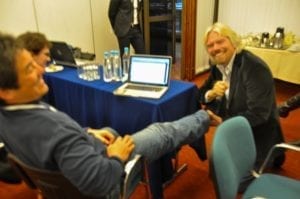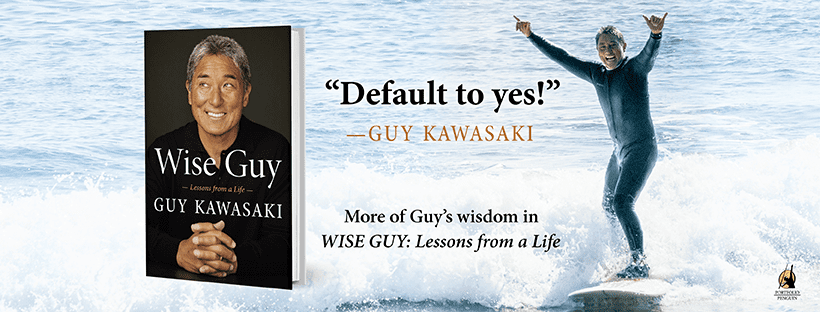Wise Guy: Lessons from a Life
Guy Kawasaki’s fifteenth book, Wise Guy: Lessons from a Life, recalls a lifetime of experiences had and lessons learned. Like most wisdom, some insights are self-evident, but only if you happen to think about them. Others are less obvious, yet still applicable to our lives.
Contents
Eleven Lessons from Guy Kawasaki
Guy often structures his talks as “Top Ten” lists, usually with an eleventh bonus point. Similarly, Guy organizes Wise Guy into 10 chapters authored by himself, plus a bonus chapter of contributions from important people in his life.
Here are examples of Guy’s insights from each chapter:
Immigration
Guy’s family immigrated from Japan to Hawaii, where Guy was born. He was raised in a modest, hard-working household, and his father became a state senator. Guy can recount more of his family’s background than most people. He advises: “Document your family’s history while your parents and grandparents are alive. Reconstructing my own family history was difficult, and there are major gaps in the information that I compiled. Ancestry.com is a good resource, but it’s not perfect.”
Education
Guy’s sixth-grade teacher, Trudy Akau, insisted that he apply to a private college-prep school. This paved the way for acceptance to Stanford. Guy learned: “Be a Trudy Akau. Take an interest in others, help them, go outside your comfort zone, and share advice with them and their families. One caring person changed the course of my life. You could do the same.”
Inspiration
Guy developed a love of exotic cars early in life. In his teen years, he was motivated to study and work hard so he wouldn’t have to drive a “crappy” car. He writes: “Don’t worry about what motivates you. What’s important is that you are. Something as materialistic as a car inspired me. More power to you if your goals are lofty, but there are many sources of inspiration.”
Apple
During his two stints at Apple, Guy evangelized Apple’s products. During a trip to the deep South, he met a man who seemed to harbor racist views; however, their shared love of the Macintosh helped bridge their gap. Guy’s takeaway: “…the lesson is to force yourself to interact with people – even those you disagree with – because more exposure increases the probability of finding commonality, developing empathy, and building a relationship.”
Business
Guy’s fascination with luxury autos led him to request a tour of the Mercedes-Benz AMG GT production line during a trip to Germany. On his return, he spread the word far and wide without expectation of reward. He was later offered a formal role: “Pay it forward. My uncompensated help and offers of assistance led to a closer relationship with Mercedes-Benz and eventually the brand-ambassador position. I did this before there was any talk of compensation.”
Values
Guy and Richard Branson were together in a speaker prep room at a conference in Moscow. 
Parenting
Guy has four children including two adopted from Guatemala. One child is dyslexic. Guy participated in an exercise that simulated the condition so that he could understand, for the first time, what his son experienced. He advises: “Empathize with others. As the saying goes, walk a mile in the shoes of others before you judge them. If you believe overcoming learning issues like dyslexia is simply a matter of trying harder and focusing more, you’re not even close to understanding, much less empathizing.”
Sports
Guy has enjoyed many sports over the years, starting with football in high school (he enjoyed hitting people). In recent years, he developed a love of hockey and surfing – sports he could enjoy with his children. Guy wrote: “Keep trying new stuff. It’s never too late to acquire a new skill or improve a current one. The acquisition of skill is a process, not an event, and the process itself can be the reward. When you pursue something passionately, if not obsessively, it makes you a more interesting person.”
LOL
Like the rest of us, Guy has been through some funny situations in his life. Guy was invited to give a talk to inmates at San Quentin about his book Enchantment. His audience – murderers and other felons – were “intelligent, respectful, and motivated.” From this, he learned: “Be thankful… I was born into one set of circumstances and went down one kind of path. The prisoners were born into different circumstances and went down a different path. There’s nothing special that I did to deserve the conditions that shaped my life and the path that I took.”
Skills
Guy is probably best known for his work as the original evangelist of the Macintosh, persuading software and hardware companies to develop products for a computer with “no installed base, minimal documentation, limited tools, and zero brand awareness.” One valuable insight was: “Touch gold. It’s very hard to evangelize crap. It’s much easier to evangelize great stuff. I learned that the starting point of evangelism, and 90 percent of the battle, is having a great product. So your first challenge as an evangelist is to find or create something great to evangelize.
Bonus: Ohana
Members of Guy’s ohana (the Hawaiian word for family, which can include anyone you have a close bond with) contributed their stories to the book. Guy’s youngest son, Nate, recalled the incident where he and Guy put dry ice into a plastic bottle, added water, and closed the top. There was an explosion. Guy’s takeaway: “Google the safety of things before you try them.”
Conclusion
Wise Guy provides a deeper dive into Kawasaki’s life than any of his previous books. He has made good moves and bad; he has been lucky and unlucky; he has learned much and taught more. Guy shares his anecdotes and learnings in a fun, relatable manner. The book is a quick read and well worth your time.

